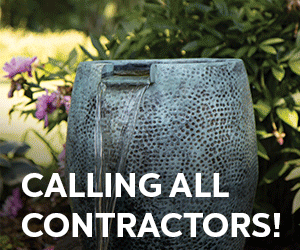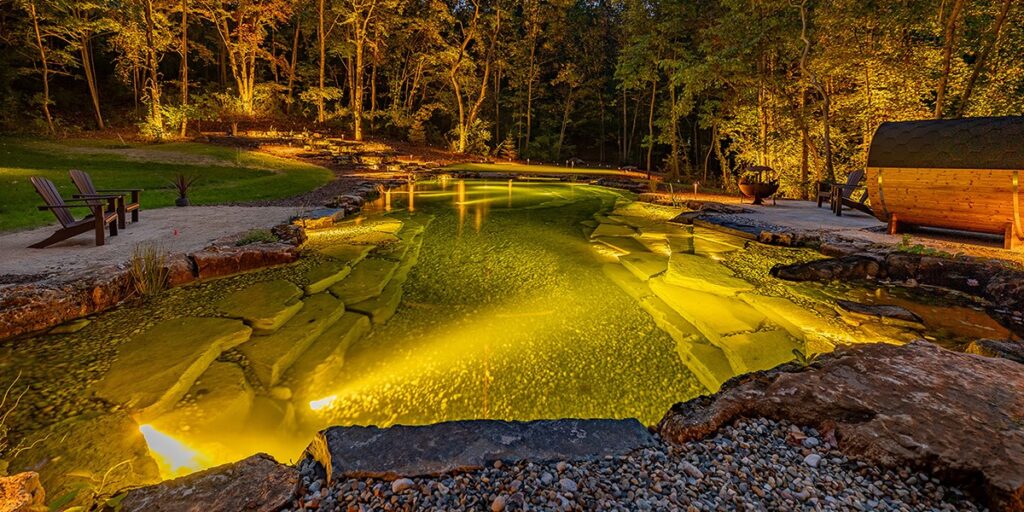
I believe that podcasting is, hands down, the No. 1 smartest way to build your personal brand equity and blow up your content marketing efforts. Building your own podcast to promote your business can be a simple, inexpensive way to get your company name at the forefront of people’s minds in your local community and across the country.
Defining and promoting what your company stands for and the skills and values that differentiate you from everyone else is what personal branding is all about. You want people to know that when it comes to building or servicing ponds, you are the go-to company for your area. Not only that, but you are also the most knowledgeable company around, you are reliable, you are trustworthy, your crew is trustworthy, you stand behind your work, and you and your crew are neat and clean up after yourselves. You are a trend setter, and you know how to keep up with the times.
Personal branding in the pond world is even more important because the standout companies are usually the ones that get recommended. Personal recommendations are absolutely the least expensive way to advertise, and because recommendations usually come from a trusted source, it’s better than conventional advertising. Your company starts a step ahead because the potential client already trusts your business. After all, they have been referred by a friend or family member they trust, and your podcast helps to demonstrate these attributes.
Why Start a Podcast?

Podcasting is a simple way to let people get to know your company at a personal level so you can help build your personal brand. Podcast referrals can become similar to a personal referral because the listeners feel like they are getting to know you at a deeper level. Sharing your knowledge, advice and thoughts in this very personal setting helps.
This is also a great way to stay in front of your existing clients — not just the prospects looking to hire you. We hear from existing clients constantly about how much they like the newest podcast episode. These same clients can be interviews for your podcast episodes.
Being on the forefront of industry standards and staying relevant to the changes in the pond industry is important. Knowledge builds trust. If you can’t answer questions about a bottom drain for someone, or you don’t understand proper flow rates for settlement tanks or waterfall filters, people will not want to put their trust in your company.
Understanding fish needs and health is also hugely important, as people will have problems with their fish, and they need to know that they can rely on you to help. They can’t just run their favorite koi to the local vet. (Maybe even interview a koi vet!)
Trust is a huge part of personal branding. Once you have your client and their friends trusting your knowledge, work ethic, reliability and support, you are well on your way. Podcasting is an easy way to spread this information. Releasing weekly episodes for your audience demonstrates discipline and consistency in your brand.
Podcasts are becoming more popular every day since they began 2004. Podcasts are a great way to connect with people — especially those who are trapped in a car for two or more hours a day commuting to and from work. Sharing your stories, experience and knowledge on a podcast allows people to get to know the real person behind the company. Letting potential clients get to know you in this more personal setting is a great way to build trust. Podcasts allow you to step outside of the rigid, professional zone of an interview and enter the area of a friend-to-friend conversation.
The audience becomes the friend you are speaking to. Let your listeners experience your emotions. When you get into great interviews and conversations, you’ll be laughing, passionately sharing your opinions on important subject matter. Don’t be surprised when you find yourself choked up and emotionally affected by your conversations.
Your audience wants to experience this side of you. They want to know you’re human, just like them. A podcast has a unique and special way of sharing the tone of your voice. The three elements of communication are 7% words you say, 38% tone of your voice and 55% body language. The sound of your voice has a massive impact on your audience. Let them hear you.
Launch Tips
Launching a podcast allows you to speak to your target audience. Hopefully as an established business, you have that well in hand. Focus your podcast on what you specialize in so you can speak with confidence on the subject. You want to be able to give your listeners value from your podcasts so they will continue to listen to you and recommend your podcast to their friends. Record solocasts sharing exciting projects, emotional experiences and challenges that you’ve had to overcome.
The recording equipment does not have to cost you an arm and a leg. We use an iPhone and an app called Motiv or a good computer with a professional microphone. Then, we send the recorded file to a company that edits it for us. Our investment was very minimal to get started.
Once you have your equipment, your train of thought and a quiet space to record in, get several podcasts completed before you make them public. Make sure that you are consistent with your personal branding, and you stay on episode topic. Share your knowledge and allow people to begin to feel as if they are in a personal relationship with you. This camaraderie will go a long way. I can’t stress how important it is to share thoughtful, interesting topics that you are knowledgeable in so you sound confident.
You can also have guest speakers such as industry experts, previous clients with fun and interesting projects, and even friends in other fields who have some relevance to your work. I recommend that once you have recorded some episodes and you are ready to go public, share it on all of your social media to help boost your podcast. I suggest you drop an episode once a week, so if you have eight episodes ready to go, you have a two-month jump. Guests typically want to share your podcast to their coworkers, friends and family, which can help bring more listeners to you and awareness to your brand.
Social Media Leverage
Episode or show notes — a synopsis of the episode — can also be used on social media to promote the podcast. They also will help with search engine optimization (SEO) on your website, too. Weekly episode releases give you an advertising outlet, that is sharing knowledge on a topic you are an expert in. This is raising your brand awareness and soon people will recognize you as an expert in your field and be waiting for your weekly release.
Encouraging your audience to interact with you through listener feedback and social media by sharing your podcast helps your podcast become more well known. This makes sure they are understanding the branding you are promoting — your knowledge, reliability, follow through and ability to solve their problems. You can do this by sharing previous clients’ stories, both success and failures. (It is important to be honest, which will definitely include failures.)
Podcasting can open doors within the pond industry. Collaborations and partnerships with influencers can help with your personal branding. Well recognized industry experts and influencers appearing on your podcast give you more credibility. This helps build your personal brand as the guy with the knowledge and connections in your area. We have had experts from many fields on our show — not just the pond industry — but these people had relatable content. Guests who share the episode they appeared on will help your podcast grow in listeners and allow you to interview bigger guests.
Our podcasts have two followings: contractors and pond lovers. We work tirelessly to try to make sure our content is valuable to both of them. Interviewing our favorite manufacturer or koi breeder and other things we are passionate about are valuable to our target audience because they share the same interests we do.
Curate Your Content
We have interviewed people about body language, personality traits and public speaking to help companies better understand how to talk to potential clients and relate to their employees. Industry experts on koi health and water quality management have helped contractors who came from landscaping into the pond world understand how things work. We have had experts on digital marketing, personal branding and customer relations help our listeners improve their skill sets in those topics. Sharing all this incredibly valuable knowledge has helped us build our personal brand and adds value to our company.
Often by the time you hear about a trend, you are already behind the curve. But in podcasting, it is not too late. Chris Williamson, the host of Modern Wisdom, says podcasting isn’t hard; you just have to be consistent. Many podcasters quit after just three episodes, and 90% quit after 10 episodes. If you can make it past 21 episodes, you are already in the top 1% and have a great chance of getting somewhere.
The most important thing is just to do it. You have nothing to lose and everything to gain. Help your business get to a higher level. Just because your friends and family are tired of hearing you talk about ponds doesn’t mean other people aren’t interested in what you have to say. You just need to get started saying it! a
Eric Triplett is the owner and operator of The Pond Digger Waterscape Design & Construction Company, and the creator of Helix Life Support Pond Filtration Systems. Triplett has dedicated his life to ponds and shares his experience, both successes and failures, to help professionals and DIYers create beautiful, low maintenance water features.


